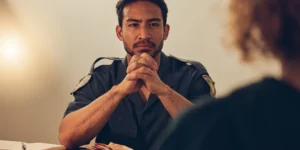Introduction
Domestic violence is a pattern of abusive behavior in any relationship that is used by one partner to gain or maintain control over another intimate partner. Domestic violence can be physical, sexual, emotional, economic, or psychological actions or threats of actions that influence another person. This includes any behaviors that intimidate, manipulate, humiliate, isolate, frighten, terrorize, coerce, threaten, blame, hurt, injure, or wound someone.
Domestic violence is not only about physically hurting someone: it’s about control. An abuser will use any means necessary to exert power over the victim, controlling their victims through intimidation, fear, and isolation.
The time to be properly prepared for domestic violence investigations is before the victim calls 911.
What is Domestic Violence?
As mentioned above, domestic violence is a pattern of abusive behavior in a relationship that is used by one partner to gain or maintain power and control over the other partner. Domestic violence can happen to anyone regardless of race, ethnic background, socioeconomic status, religion, age, education, or gender.
There are many different forms of domestic violence, including physical abuse, sexual abuse, emotional abuse, economic abuse, and psychological abuse. Domestic violence is not just one incident of violence; it is a pattern of behavior that usually escalates over time.
The Process of Criminal Investigation
Few people realize how complicated and difficult domestic violence criminal investigations can be and often, police treat these investigations as routine. Don’t. Due to the sensitive and personal nature of these types of cases, police officers and detectives must tread carefully to ensure that they are conducting a thorough and objective investigation.
The first step in any criminal investigation is to gather evidence. This can be done through interviews with witnesses, victims, and suspects. However, it is important to note that not all evidence will be gathered through interviews; investigators may also collect physical evidence, such as fingerprints or DNA samples.
Once the evidence has been collected, it must be analyzed to determine what happened and who was involved. This step can often be the most time-consuming and difficult part of the investigation, as detectives must sift through a large amount of information to identify the key facts. Other times, it’s plainly obvious.
The Role of Police in Domestic Violence Investigations
Police officers play an important role in the response to domestic violence cases. You are the first responders (the fire department is staging) when domestic violence incidents occur. You as a police officer play a vital role in providing support to victims and gathering evidence to help prosecutors build domestic violence cases.
When police respond to domestic violence calls, you should always take the call seriously. Victims of domestic violence may be reluctant to press charges or cooperating with you and investigators. It is important for you to thoroughly document all evidence of abuse. In some jurisdictions, police may make arrests even if the victim does not want to press charges; in other jurisdictions, victims must explicitly request that charges be filed in order for an arrest to be made. Know your rules of engagement and stay up to date on case law.
Evidence gathered by police at the scene of a domestic violence incident can be crucial in helping prosecutors build cases against abusers. In many jurisdictions, footage from body-worn cameras worn by police officers can provide valuable evidence of abuse. Police officers should also take care to document any injuries they observe on victims, as well as any damage to property. When taking photos of injuries, use a scale. These evidentiary photos are critical to prosecution and without a scale, may not be admitted as evidence (learn more about our digital crime scene photography course). Police reports should be detailed and accurate, as they may be used as evidence in court proceedings.
Domestic violence can have a profound impact on victims, and it is important for police to provide support to victims during and after domestic violence incidents. Many police departments have Victim Services Units that can provide information about local resources and help connect victims with social services providers. In some jurisdictions, Victim advocates may also accompany police on Domestic Violence calls to provide support to victims. Does yours? If not, it would be worthwhile to launch a program and we can help – just send us an email.
The Role of the Prosecutor in Domestic Violence Investigations
The role of the prosecutor in domestic violence cases is critical to ensure that after these cases are thoroughly and professionally investigated, justice is served. Prosecutors must work closely with law enforcement to ensure that all evidence is collected and properly preserved. In addition, prosecutors should be available to offer guidance and advice to law enforcement throughout the investigation.
Once an arrest has been made, prosecutors will review the case to determine what charges should be filed. They will also work with victims to ensure their safety and help them through the criminal justice process. In some cases, prosecutors may also choose to file civil charges against the abuser in addition to or instead of criminal charges.
It is important for prosecutors to hold abusers accountable for their actions and send a strong message that domestic violence will not be tolerated. By working collaboratively with law enforcement and victim advocates, prosecutors can help make sure that justice is served in these cases.
The Role of the Victim in Domestic Violence Investigations
The role of the victim in domestic violence investigations is to provide law enforcement with as much information as possible about the incidents of abuse. Victims should be prepared to answer questions about what happened, when it happened, where it happened, and any other relevant details. They should also be prepared to identify their abuser from a photograph or lineup if necessary.
It is important for victims to understand that they are not required to participate in the investigation if they do not wish to do so. However, their cooperation can be vital in bringing the abuser to justice and preventing future incidents of abuse.
Your treatment of the victim will set the tone of the investigation. This is not just another call.
The Impact of Domestic Violence on Children
Children who witness or experience domestic violence can suffer a host of short- and long-term effects. These children are more likely to have problems with anxiety, depression, nightmares, sleeping problems, and aggression.
They may have difficulty in school and have trouble forming healthy relationships when they reach adulthood. It is important for parents, guardians, and other adults in children’s lives to be aware of the signs that a child may be experiencing domestic violence so they can get the help they need.
In addition to the devastating effects domestic violence has on children, in many jurisdictions it is an enhancement to the charge and may elevate the charging offense to a felony.
The Importance of Documentation in Domestic Violence Investigations
One of the most important aspects of investigating domestic violence is documentation. Documentation can provide law enforcement with a clear understanding of what happened, when it happened, and who was involved. This information can be vital in building a case against the perpetrator and in ensuring the safety of the victim.
We offer a Domestic Violence Investigative Checklist for purchase separately or included with our Domestic Violence Criminal Investigations course. We also offer a package of our most popular checklists here.
Domestic violence investigations often involve complex legal issues, and documentation can help to clarify these issues. In addition, documentation can help to establish patterns of abuse, which can be important in determining the best course of action for protecting the victim.
Documentation should be thorough and should include all relevant information, such as:
- The names, addresses, and phone numbers of the victim and any witnesses
- A detailed description of the incident, including any injuries sustained by the victim
- A description of any property damage that occurred during the incident
- Any prior incidents of domestic violence involving the same parties
Remember, domestic violence is a serious crime, and those who commit these crimes should be held accountable for their actions.
Properly Training for Domestic Violence Criminal Investigations Starts Before the Call
Find out what the legal definition of domestic violence is in your jurisdiction. Learn about the laws that are relevant to domestic violence investigations. Develop an understanding of the dynamics of domestic violence cases, including the risk factors for, and warning signs of, abuse.
You need the proper training before the victim calls for help and often times the training you received in the academy and while in FTO is forgotten, not updated, irrelevant or glossed over.
Our Domestic Violence Investigation training is current, relevant and updated to include the most comprehensive information out there to keep you on top of your game.
Conclusion
Domestic violence is a complex and serious problem that requires the combined efforts of law enforcement, prosecutors, the courts, victim service providers, and the community to effectively address. A successful response to domestic violence must be comprehensive and address not only the immediate needs of victims and their families, but also the underlying causes of violence.
The criminal justice system plays a critical role in responding to domestic violence, but it cannot do so effectively without the cooperation and support of the entire community. Law enforcement agencies must develop policies and procedures that are responsive to the needs of domestic violence victims and hold offenders accountable for their actions. Prosecutors must work diligently to ensure that offenders are prosecuted to the fullest extent of the law. The courts must sentence offenders according to the gravity of their crimes and hold them accountable for complying with court orders. And victim service providers must be available to provide safe havens and necessary services for victims and their families.
Most importantly, we as a society must work together to change the attitudes and beliefs that perpetuate violence against women. Only then will we see a real decrease in the incidence of domestic violence.





